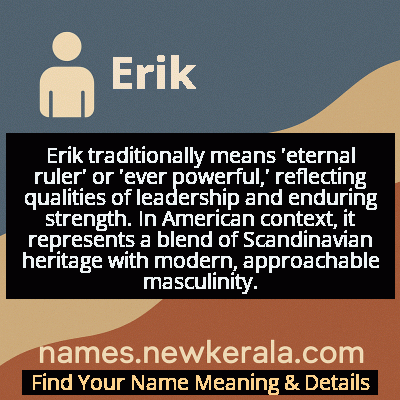Erik Name Meaning & Details
Origin, Popularity, Numerology Analysis & Name Meaning of Erik
Discover the origin, meaning, and cultural significance of the name ERIK. Delve into its historical roots and explore the lasting impact it has had on communities and traditions.
Name
Erik
Gender
Male
Origin
American
Lucky Number
7
Meaning of the Name - Erik
Erik traditionally means 'eternal ruler' or 'ever powerful,' reflecting qualities of leadership and enduring strength. In American context, it represents a blend of Scandinavian heritage with modern, approachable masculinity.
Erik - Complete Numerology Analysis
Your Numerology Number
Based on Pythagorean Numerology System
Ruling Planet
Neptune (Ketu)
Positive Nature
Intuitive, analytical, spiritual, and inquisitive.
Negative Traits
Secretive, reserved, aloof, and can be overly critical.
Lucky Colours
Green, yellow.
Lucky Days
Monday.
Lucky Stones
Cat’s eye, moonstone.
Harmony Numbers
1, 5, 6.
Best Suited Professions
Scientists, researchers, spiritual leaders, detectives.
What People Like About You
Depth of knowledge, analytical skills, spirituality.
Famous People Named Erik
Erik the Red
Explorer
Founded the first Norse settlement in Greenland
Erik Spoelstra
Basketball Coach
Led Miami Heat to multiple NBA championships as head coach
Erik Satie
Composer
Influential French composer known for avant-garde works like 'Gymnopédies'
Erik Erikson
Psychologist
Developed theory of psychosocial development and coined 'identity crisis'
Name Variations & International Equivalents
Click on blue names to explore their detailed meanings. Gray names with will be available soon.
Cultural & Historical Significance
In American context, Erik gained prominence during the 19th and 20th centuries as Scandinavian immigrants brought their naming traditions to the United States. The name became popular among Nordic-American communities while also appealing to broader American society for its strong, straightforward sound. During the 20th century, Erik evolved to represent both traditional masculine virtues and modern American values of individuality and humor. The name's versatility allows it to bridge cultural heritage with contemporary appeal, making it equally suitable for corporate executives, artists, and adventurers.
Extended Personality Analysis
People named Erik are typically characterized by their confident, charismatic nature and excellent sense of humor. They often possess natural leadership qualities combined with a witty, engaging personality that makes them popular in social situations. Eriks tend to be adventurous and innovative, willing to take calculated risks while maintaining practical judgment. Their humor is often clever and observational, allowing them to navigate social dynamics effectively and build strong relationships. Many Eriks balance ambition with genuine warmth, creating lasting personal and professional connections.
In professional settings, Eriks are often seen as reliable problem-solvers who approach challenges with creativity and determination. They typically excel in positions that allow them to exercise both leadership and innovation. Personally, they value loyalty and authenticity in relationships, often serving as the 'rock' for friends and family. Their combination of strength and humor makes them particularly effective at diffusing tension and bringing people together. While they can be competitive, most Eriks prioritize collaboration and mutual success over individual achievement.
Modern Usage & Popularity
Erik maintains consistent popularity in the United States, typically ranking within the top 300 male names despite fluctuations in naming trends. The name experienced its peak usage during the 1970s through 1990s but has stabilized as a classic, reliable choice. It remains particularly popular in regions with strong Scandinavian heritage like Minnesota, Wisconsin, and the Pacific Northwest. Modern parents often choose Erik for its balance of traditional strength and contemporary appeal, appreciating its international recognition and easy pronunciation. While not as trendy as some newer names, Erik continues to be selected by parents seeking a name that conveys both heritage and modernity without being overly common. Its steady usage pattern suggests it will remain a solid choice for years to come.
Symbolic & Spiritual Meanings
Symbolically, Erik represents enduring leadership, exploration, and eternal strength. The name evokes the Viking spirit of adventure and discovery, symbolizing the courage to venture into unknown territories and establish new foundations. Metaphorically, it suggests someone who builds lasting legacies through wisdom and determination rather than brute force. The 'eternal ruler' meaning translates symbolically to consistent reliability and steadfastness in character. In psychological terms, Erik represents the integration of traditional values with innovative thinking—someone who respects heritage while forging new paths. The name also carries connotations of humor and adaptability, suggesting that true strength includes the ability to laugh and adjust to changing circumstances while maintaining core principles.

